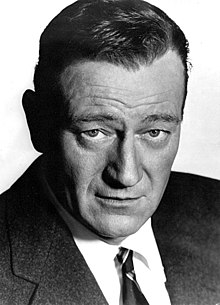
Back John Wayne Afrikaans John Wayne AN جون واين Arabic جون وين ARZ John Wayne AST Con Ueyn Azerbaijani جان وین AZB Джон Уэйн Bashkir Džuons Veins BAT-SMG Джон Уэйн Byelorussian
John Wayne | |
|---|---|
 Wayne c. 1965 | |
| Born | Marion Robert Morrison May 26, 1907 Winterset, Iowa, U.S. |
| Died | June 11, 1979 (aged 72) Los Angeles, California |
| Resting place | Pacific View Memorial Park 33°36′34″N 117°51′12″W / 33.60953°N 117.85336°W |
| Other names |
|
| Alma mater | University of Southern California |
| Occupations |
|
| Years active | 1926–1979 |
| Political party | Republican |
| Spouses | Josephine Saenz
(m. 1933; div. 1945) |
| Children | 7, including Michael, Patrick, and Ethan |
| Awards | Presidential Medal of Freedom Congressional Gold Medal Hollywood Walk of Fame |
| Website | Official website |
| Signature | |
 | |
Marion Robert Morrison[1][a] (May 26, 1907 – June 11, 1979), professionally known as John Wayne and nicknamed "the Duke", was an American actor who became a popular icon through his starring roles in films which were produced during Hollywood's Golden Age, especially in Western and war movies. His career flourished from the silent era of the 1920s through the American New Wave, as he appeared in a total of 179 film and television productions. He was among the top box-office draws for three decades[3][4] and appeared with many other important Hollywood stars of his era. In 1999, the American Film Institute selected Wayne as one of the greatest male stars of classic American cinema.[5]
Wayne was born in Winterset, Iowa, but grew up in Southern California. After losing his football scholarship to the University of Southern California due to a bodysurfing accident,[6] he began working for the Fox Film Corporation. He appeared mostly in small parts, but his first leading role came in Raoul Walsh's Western The Big Trail (1930), an early widescreen film epic that was a box-office failure. He played leading roles in numerous B movies during the 1930s, most of them also Westerns, without becoming a major name. John Ford's Stagecoach (1939) made Wayne a mainstream star, and he starred in 142 motion pictures altogether. According to biographer Ronald Davis, "John Wayne personified for millions the nation's frontier heritage."[7]
Wayne's other roles in Westerns included a cattleman driving his herd on the Chisholm Trail in Red River (1948), a Civil War veteran whose niece is abducted by a tribe of Comanches in The Searchers (1956), a troubled rancher competing with a lawyer (James Stewart) for a woman's hand in The Man Who Shot Liberty Valance (1962), and a cantankerous one-eyed marshal in True Grit (1969), for which he received the Academy Award for Best Actor. Wayne is also remembered for his roles in The Quiet Man (1952) with Maureen O'Hara, Rio Bravo (1959) with Dean Martin, and The Longest Day (1962). In his final screen performance, he starred as an aging gunfighter battling cancer in The Shootist (1976). Wayne made his last public appearance at the Academy Awards ceremony on April 9, 1979,[8][9] and died of stomach cancer two months later.[10] In 1980, he was posthumously awarded the Presidential Medal of Freedom, the highest civilian honor of the United States.[11][12]
- ^ Daniel, Diane (February 27, 2015). "In Iowa, a New John Wayne Museum". The New York Times. Archived from the original on August 2, 2018. Retrieved January 6, 2019.
- ^ Roberts & Olson 1995, p. 647.
- ^ "John Wayne". The Numbers. Archived from the original on September 23, 2012. Retrieved March 29, 2012.
- ^ "Quigley's Annual List of Box-Office Champions, 1932–1970". Reel Classics. Archived from the original on April 28, 2016. Retrieved March 25, 2012.
- ^ "American Film Institute". October 10, 2018. Archived from the original on October 10, 2018. Retrieved June 1, 2021.
- ^ Roberts & Olson 1995, pp. 63–64.
- ^ Davis, Ronald L. (2012). Duke: The Life and Image of John Wayne. University of Oklahoma Press. p. 6. ISBN 9780806186467. Archived from the original on November 28, 2015. Retrieved June 27, 2015.
- ^ Duke, We're Glad We Knew You: John Wayne's Friends and Colleagues Remember His Remarkable life by Herb Fagen Archived August 26, 2016, at the Wayback Machine page 230; Retrieved February 13, 2016
- ^ Easy Riders Raging Bulls: How the Sex-Drugs-And Rock 'N Roll Generation Saved Hollywood by Peter Biskind page 372; Retrieved February 13, 2016
- ^ Los Angeles Times Archived July 13, 2017, at the Wayback Machine June 12, 1979; Retrieved February 13, 2016
- ^ Kehr, Dave. "John Wayne News". The New York Times. Archived from the original on June 16, 2013. Retrieved July 30, 2011.
- ^ Public Papers of the Presidents of the United States, Jimmy Carter, 1980–1981, Book 2: May 24 to September 26, 1980. Government Printing Office. p. 1061. Archived from the original on August 4, 2020. Retrieved March 3, 2019.
Cite error: There are <ref group=lower-alpha> tags or {{efn}} templates on this page, but the references will not show without a {{reflist|group=lower-alpha}} template or {{notelist}} template (see the help page).